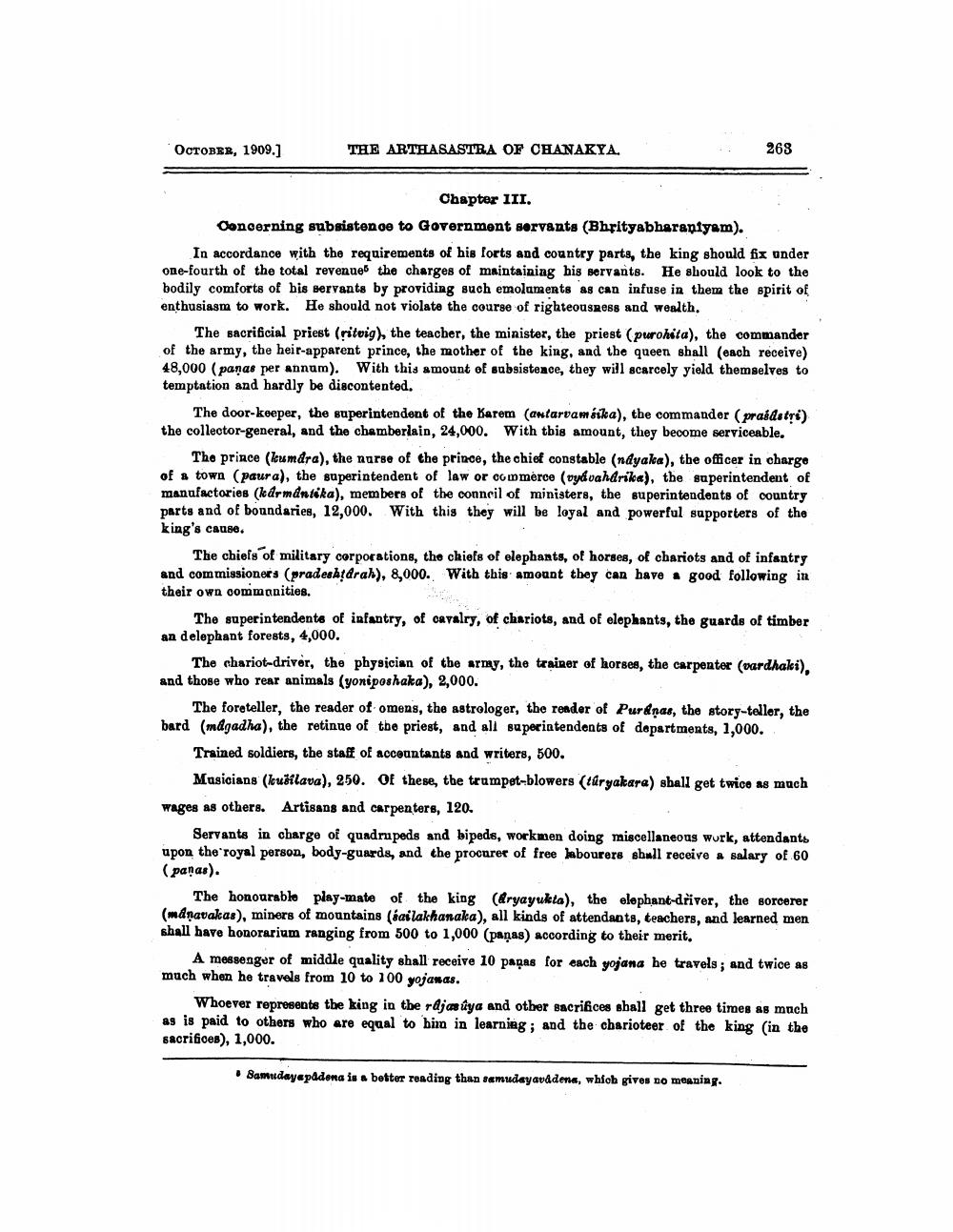________________
OCTOBER, 1909.)
THE ARTHASASTRA OF CHANAKYA.
263
Chapter III. Concerning subsistence to Government servants (Bhrityabharaniyam).
In accordance with the requirements of his forts and country parts, the king should fix onder one-fourth of the total revenue the charges of maintaining his servants. He should look to the bodily comforts of bis servants by providing such emolaments as can infuse in them the spirit of enthusiasm to work. He should not violate the course of righteousness and wealth.
The sacrificial priest (ritoig), the teacher, the minister, the priest (purohita), the commander of the army, the heir-apparent prince, the mother of the king, and the queen shall (each receive) 48,000 (paņas per annum). With this amount of subsistence, they will scarcely yield themselves to temptation and hardly be discontented.
The door-koeper, the superintendent of the Kerem (antarvamáika), the commander prašdstri) the collector-general, and the chamberlain, 24,000. With this amount, they become serviceable.
The prince (kumdra), the nurse of the prince, the chief constable (ndyaka), the officer in charge of a town (paura), the superintendent of law or commerce (vyd vahdrika), the superintendent of manufactories (ke dr mdntika), members of the conncil of ministers, the superintendents of country parts and of boundaries, 12,000. With this they will be loyal and powerful supporters of the king's cause.
The chiefs of military corporations, the chiefs of elephants, of horses, of chariots and of infantry and commissioners (pradeshtdrah), 8,000. With this amount they can have good following in their own commanities.
The superintendents of infantry, of cavalry, of chariots, and of elephants, the guards of timber an delephant forests, 4,000.
The chariot-driver, the physician of the army, the trainer of horses, the carpenter (vardhaki), and those who rear animals (yoniposhaka), 2,000.
The foreteller, the reader of omens, the astrologer, the reader of Pur&nas, the story-teller, the bard (mdgadha), the retinue of tbe priest, and all superintendents of departments, 1,000.
Trained soldiers, the staff of accountants and writers, 500.
Musicians (loučilava), 250. Of these, the trumpet-blowers (tAryakara) shall get twice as much wages as others. Artisans and carpenters, 120.
Servants in charge of quadrupeds and bipeds, workmen doing miscellaneous work, attendants upon the royal person, body-guards, and the procurer of free labourers shall receive a salary of 60 paņas).
The honourable play-mate of the king (@ryayukta), the elephant-driver, the sorcerer (manavakas), miners of mountains (sailakhanaka), all kinds of attendants, teachers, and learned men shall have honorarium ranging from 500 to 1,000 (paņas) according to their merit.
A messenger of middle quality shall receive 10 paņas for each yojana he travels, and twice as much when he travels from 10 to 100 yojanas.
Whoever represents the king in the rdjas ûya and other sacrifices shall get three times as much as is paid to others who are equal to him in learning; and the charioteer of the king in the sacrifices), 1,000.
• Banudayapadena is a better reading than samudayavddena, whfoh gives no meaning.




